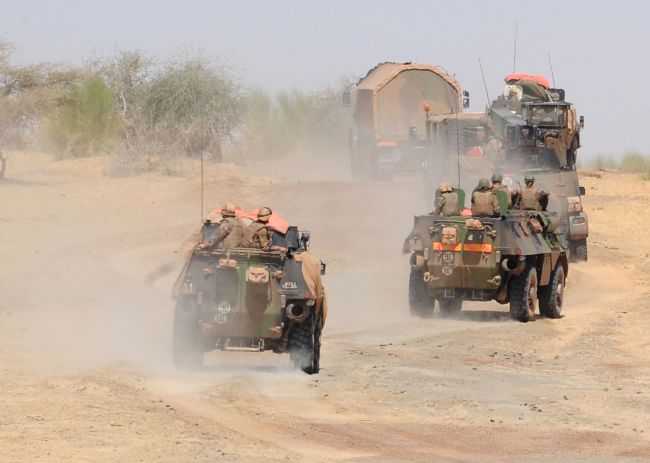 |
A convoy of French army vehicles patrols between Timbuktu and Douentza in Mali on Monday. (AFP-Yonhap News) |
GAO, Mali (AFP) ― French fighter jets have pounded Islamist supply bases in northern Mali seeking to flush the insurgents out of hiding, as France and the U.S. on Monday called for African troops to quickly take over the operation.
After a three-week campaign by French-led forces drove the extremists from most of their strongholds, including the cities of Timbuktu and Gao, dozens of French warplanes carried out major air strikes on rebel training and logistics centres Sunday in Mali’s mountainous northeast, near the Algerian border.
“It is about destroying their rear bases, their depots,” Foreign Minister Laurent Fabius told France Inter radio.
“They have taken refuge in the north and the northeast but they can only stay there long-term if they have ways to replenish their supplies. So the army, in a very efficient manner, is stopping them from doing so.”
The radical Islamists who controlled northern Mali for 10 months have fled into the Adrar des Ifoghas massif in the Kidal region, a craggy mountain landscape honeycombed with caves.
Complicating the operation, they are believed to be holding seven French hostages with them, kidnapped in Mali and Niger in 2011 and 2012.
The families of four hostages taken in Niger voiced fears for their lives late Monday, saying while the proximity of French forces “near where they are imprisoned” gives them a bit of hope, “the legitimate desire for their liberation should not lead to their sacrifice,” they said in a statement sent to AFP.
Algeria has beefed up its positions on the Malian border to prevent “the infiltration of terrorist groups,” Mohamed Baba Ali, a member of parliament from the southern town of Tamanrasset, said.
Algeria was reluctantly drawn into the Mali conflict when it agreed to let French warplanes use its airspace.
Days later, Islamist gunmen attacked an Algerian gas field, unleashing a hostage crisis that left 37 foreigners dead.
France is eager to pass the baton in Mali to some 8,000 African troops pledged for the U.N.-backed AFISMA force, still deploying at a snail’s pace, after sweeping to its former colony’s aid on Jan. 11 as the Islamists threatened to advance south towards the capital Bamako.
“We want to be rapidly relieved by the AFISMA African forces in the cities that we hold,” the French foreign minister said.
in Paris, U.S. Vice President Joe Biden, after meeting with French President Francois Hollande, backed that demand and said the United Nations should make the African mission a formal U.N. peacekeeping operation -- a plan U.N. officials say they are pushing forward.
Despite being keen to share the military burden, Hollande vowed during a visit to Mali on Saturday that he would not abandon the country to chaos.
Malian Foreign Minister Tieman Coulibaly urged France to stay on longer.
“You have to take this operation to the bitter end and destroy the terrorist networks in Mali,” he said.
Al-Qaida-linked groups seized control of the bow-tie shaped nation’s vast northern triangle in the wake of a coup in Bamako in March last year.
The Islamists initially allied with Tuareg rebels -- fighting a decades-old battle for independence of land where they have lived as desert nomads for centuries -- but quickly cast them aside and imposed a brutal version of Islamic sharia law.
Northern residents have celebrated throwing off the shackles of harsh Islamist rule, but are facing food shortages as Arab and Tuareg traders flee reprisal attacks against light-skinned Malians accused of backing the Islamists.
Britain-based aid group Oxfam said fighting had severely restricted traditional trade routes. If the traders do not come back soon, it warned, markets will likely not be properly stocked and food prices will stay high.
This comes on top of a crippling food crisis which has put an estimated 18 million people at risk of starvation across the Sahel, an issue which has rarely made headlines even during the Mali conflict.
The International Red Cross said despite the retreat of the Islamists, residents who had fled fighting -- estimated by the U.N. at over 350,000 -- were hesitant to return home, with only 7,000 in central Mali returning so far.
As the conflict in Mali shifts into a new phase, delegations from the African Union, United Nations, European Union, West African regional body ECOWAS, banks and aid groups are to meet Tuesday in Brussels to mull the country’s path to stability once the offensive ends.
“When a state falls apart it takes time to put it together again, like Humpty Dumpty,” said a senior official, speaking on condition of anonymity.





![[Exclusive] Hyundai Mobis eyes closer ties with BYD](http://res.heraldm.com/phpwas/restmb_idxmake.php?idx=644&simg=/content/image/2024/11/25/20241125050044_0.jpg)
![[Herald Review] 'Gangnam B-Side' combines social realism with masterful suspense, performance](http://res.heraldm.com/phpwas/restmb_idxmake.php?idx=644&simg=/content/image/2024/11/25/20241125050072_0.jpg)

